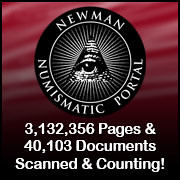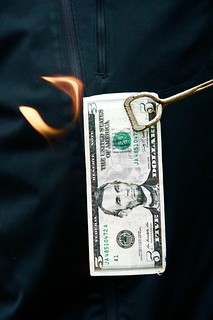
About UsThe Numismatic Bibliomania Society is a non-profit association devoted to the study and enjoyment of numismatic literature. For more information please see our web site at coinbooks.org SubscriptionsThose wishing to become new E-Sylum subscribers (or wishing to Unsubscribe) can go to the following web page link MembershipThere is a membership application available on the web site Membership Application To join, print the application and return it with your check to the address printed on the application. Print/Digital membership is $40 to addresses in the U.S., and $60 elsewhere. A digital-only membership is available for $25. For those without web access, write to: Charles Heck, Treasurer AsylumFor Asylum mailing address changes and other membership questions, contact Chuck at this email address: treasurer@coinbooks.org SubmissionsTo submit items for publication in The E-Sylum, write to the Editor at this address: whomren@gmail.com
BUY THE BOOK BEFORE THE COINSale Calendar
|
- WAYNE'S WORDS: THE E-SYLUM JULY 19, 2020
- KRAUSE PUBLICATIONS PHOTO ARCHIVE OFFERED
- NEW BOOK: BEHOLD YOUR KING
- NEW BOOK: RENNIKS AUSTRALIAN COIN & BANKNOTE
- NEW BOOK: COINAGE OF THE AKASSUMITE KINGS
- NEW PODCAST: ANA'S TWO BITS
- DR. H. DON ALLEN (1931-2020)
- NEWMAN PORTAL TRANSCRIBES 1809 DIE MINT LETTER
- VIDEO: RALPH ROSS INTERVIEW
- AUDIO: COINWEEK INTERVIEW WITH PETER TOMPA
- ANA CANCELS 2020 WORLD'S FAIR OF MONEY
- ANA MONEY TALKS LECTURE SERIES REGISTRATION
- ANA SUNDMAN LECTURE SERIES REGISTRATION
- 2021 NEW YORK INTERNATIONAL CONVENTION
- NOTES FROM E-SYLUM READERS: JULY 19, 2020
- STANDARD COIN CARD MYSTERY
- VOCABULARY TERM: EDGE
- WAITE B. LEWIS (1871-1936)
- HARVEY STACK'S NUMISMATIC FAMILY, PART 74
- SOFAER COLLECTION OF PALESTINE COINS AND TOKENS
- NUMISMATIC NUGGETS: JULY 19, 2020
- THE BYZANTINE ANONYMOUS FOLLIS
- JEFF BURKE'S NEW 1909 V.D.B. LINCOLN CENT
- 1910 EXPERIMENTAL FINISH DOUBLE EAGLE
- 1919 NEW YORK ASSAY OFFICE SILVER INGOT
- THE CASE OF THE BOGUS BURNING BILL
- LOUIS COLAVECCHIO, MASTER COUNTERFEITER
- OFFSET PRINTING ERRORS
- MORE ON THE 2020 TENINO WOODEN SCRIP
- CBS TENINO WOODEN MONEY SEGMENT
- OMAN'S NEW 50 RIAL BANKNOTE
- LOOSE CHANGE: JULY 19, 2020
- SHORTAGE LEADS BANKS TO PAY PREMIUM FOR CHANGE
Click here to access the complete archive
Click here to unsubscribe (scroll down)
To comment or submit articles, reply to whomren@gmail.com
Content presented in The E-Sylum is not necessarily researched or independently fact-checked, and views expressed do not necessarily represent those of the Numismatic Bibliomania Society.
WAYNE'S WORDS: THE E-SYLUM JULY 19, 2020
 New subscribers this week include:
Tom Murphy and
Paul Stolzer.
Welcome aboard! We now have 6,142 subscribers.
New subscribers this week include:
Tom Murphy and
Paul Stolzer.
Welcome aboard! We now have 6,142 subscribers.
Thank you for reading The E-Sylum. If you enjoy it, please send me the email addresses of friends you think may enjoy it as well and I'll send them a subscription. Contact me at whomren@gmail.com anytime regarding your subscription, or questions, comments or suggestions about our content.
This week we open with the sale of the Krause Publications photo archive, three new books, a new podcast, updates from the Newman Numismatic Portal, and more.
Other topics this week include online ANA presentations, the NYINC show, Palestine coins and tokens, the 1909 VDB cent, the 1919 New York Assay Office silver ingot, master counterfeiter Louis Colavecchio, offset printing errors, Oman's new banknote, and more on Tenino wooden money.
To learn more about the coins of Pontius Pilate, Australian coins and banknotes, research tools of the Newman Numismatic Portal and The Numismatist Digital Archives, author H. Don Allen, the Pennsylvania Railroad Heroic Service medal, the Bebee double-denomination note, coin and medal edges, an 1866 Shield Nickel pattern, a gold Carnegie Hero medal, and the case of the bogus burning bill, read on. Have a great week, everyone!
Wayne Homren
Editor, The E-Sylum
KRAUSE PUBLICATIONS PHOTO ARCHIVE OFFERED
George Cuhaj submitted this announcement of the upcoming sale of the Krause Publications photo archive. Thanks. This could be a great opportunity for the right researchers and collectors. -Editor
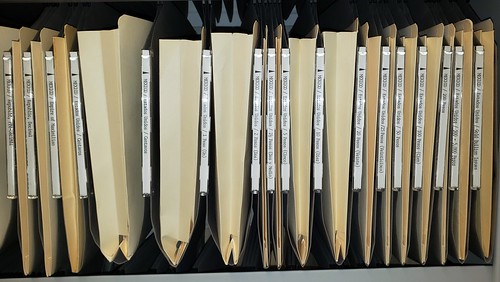
When the remaining staff of the old Krause Publication-F+W now AIM Media staff relocated to Stevens Point, Wis. (Some 30 miles away), the 700 E. State Street Building was purchased by the Iola Car Show. Slowly over the past two years cubicles and other equipment have been moved out and repurposed.
The Iola Historical Society and the Iola Car Show jointly share in proceeds of the sale of the abandoned portions of the numismatic library (and as you have read, the Newman Portal will benefit from Numismatic News going digital. The American Numismatic Society has benefited by accepting dealer Fixed price Lists which are not duplicated).
This left the Black & White photo archive for the 20th Century Standard Catalog coin books and the World Paper Money Standard Catalogs. There are 10x14 inch folders in the coin area organized by country political groups (just as in the catalog) or by issuing bank for the Paper Money section.
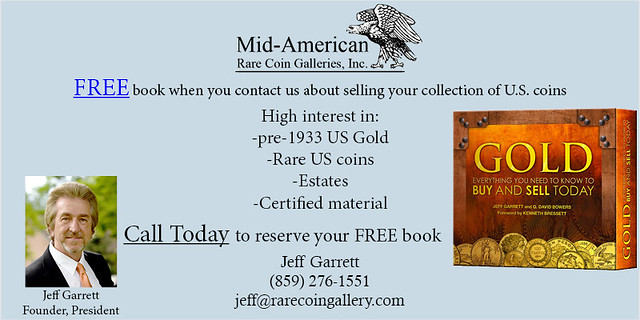
NEW BOOK: BEHOLD YOUR KING
E-Sylum subscriber Mark Bracken is a collector and dealer in ancient roman coins. He writes:
"A friend of mine, Bill Glassman, a pastor, has written a book confirming and proving the accuracy of the events in the life of Jesus."
Mark kindly submitted the following synopsis of the book. Thanks. -Editor
NEW BOOK: "Behold Your King” – confirming and proving the accuracy of the events in the life of Jesus.
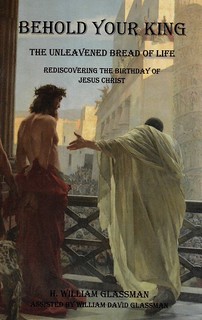 What impressed me about the book, from strictly a coin collector perspective, was the wealth of
interesting and groundbreaking information on the dating of the coins of Octavian (Augustus), Tiberius
and Pontius Pilate. After reading this material, I now believe there are mistakes in the commonly
accepted timeframes for coins issued by the aforementioned emperors, Pontius Pilate and his
predecessor (who issued coins that have been mis-attributed to another prefect). There is also a
chapter on the Shroud of Turin, specifically focusing on the coins (which have been identified as from
Pontius Pilate) that were placed on the eyes of Jesus before he was wrapped in the shroud. The
material is quite in depth and a very interesting read. I think many other collectors would agree.
What impressed me about the book, from strictly a coin collector perspective, was the wealth of
interesting and groundbreaking information on the dating of the coins of Octavian (Augustus), Tiberius
and Pontius Pilate. After reading this material, I now believe there are mistakes in the commonly
accepted timeframes for coins issued by the aforementioned emperors, Pontius Pilate and his
predecessor (who issued coins that have been mis-attributed to another prefect). There is also a
chapter on the Shroud of Turin, specifically focusing on the coins (which have been identified as from
Pontius Pilate) that were placed on the eyes of Jesus before he was wrapped in the shroud. The
material is quite in depth and a very interesting read. I think many other collectors would agree.

NEW BOOK: RENNIKS AUSTRALIAN COIN & BANKNOTE
The new 2020 edition of Renniks Australian Coin & Banknote guide is available. Here's information from the publisher's site. -Editor
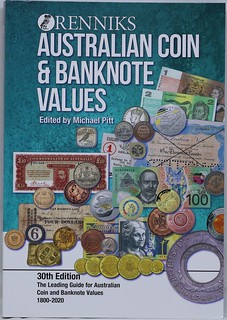 Renniks Australian Coin & Banknote Values 30th Ed.
Renniks Australian Coin & Banknote Values 30th Ed.
Hardcover
ISBN: 9780987105790
$49.95
This comprehensive guide to Australian Coin & Banknote Values contains over 3,850 images and countless thousands of valuations. This book is a must for all collectors, whether you are just beginning or an advanced collector. Latest information compiled using weighted averages where possible to ensure the accuracy of pricing.
Quality reproduction of photos makes it easy to identify items. Covered are copper, silver, gold, nickel and allow coins and notes used in Australia from 1800 to present. Subjects include Pre-Decimal and Decimal currency, as well as privately issued banknotes, war issues, and privately issued tokens. Also included are latest Royal Australian Mint, Perth Mint & Australia Post Numismatic Covers.
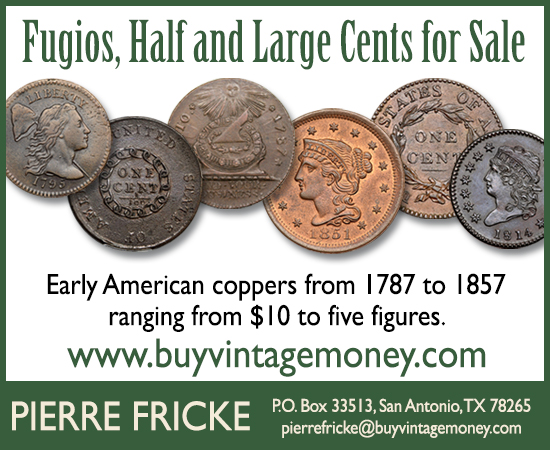
NEW BOOK: COINAGE OF THE AKASSUMITE KINGS
A new book on the coinage of the Akassumite kings has been published. Here's a Google translation of information from the German publisher's web site. I was alerted to this by a CoinsWeekly review article by Ursula Kampmann - see the link below. -Editor
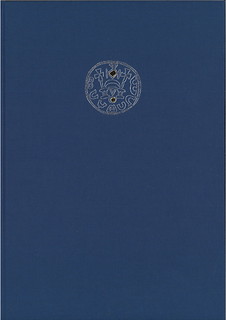 History of the coinage of the Akassumite kings in late antiquity
W. Hahn and R. Keck
History of the coinage of the Akassumite kings in late antiquity
W. Hahn and R. Keck
Vienna 2020
ISBN 978-3-9504268-0-9
Format 21.5 x 30.5 cm
312 pages
20 plates
€ 58.00
As a result of decades of preparatory work, the two authors present a comprehensive coin history of the ancient Ethiopian empire of Aksum, which is based on an intensive collection of materials from all relevant sources. It is only a comparatively small area in the late antique coin landscape, so to speak, a monetary island on the southern edge of the world known at that time, but which was on a main trade route to India. The coins were not only used for royal representation. Their temporal extension runs parallel to the Roman coins of the emperors Diocletianus to Heraclius, to which there are some cross-connections.
NEW PODCAST: ANA'S TWO BITS
Two episodes of the American Numismatic Association's new podcast Two Bits are available for listening. -Editor
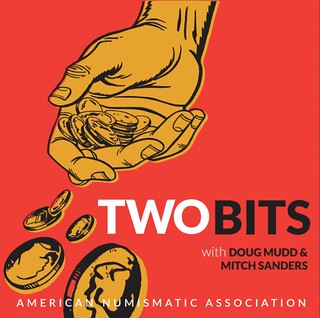 Welcome to Two Bits, the American Numismatic Association's podcast about the wonderful world of coins and paper currency. Enjoy wide-ranging discussions about numismatics, in a fun and engaging way.
Welcome to Two Bits, the American Numismatic Association's podcast about the wonderful world of coins and paper currency. Enjoy wide-ranging discussions about numismatics, in a fun and engaging way.
Host Doug Mudd has collected since the age of 10 and is currently interested in ancients, modern paper money, WWI and pre-19th century medals and coins. He was Collection Manager for the Smithsonian Institution's National Numismatic Collection from 1991 to 2004 and has been the curator of the ANA's Money Museum since 2004. Author of numerous numismatic lectures, exhibits and publications, he writes a regular column for The Numismatist and has been an ANA Summer Seminar instructor since 2002. He is also the author of the NLG award winning book All the Money in the World printed in 2006 by Harper Collins as part of Smithsonian books.
Host Mitch Sanders is the author of the column "Getting Started" in the ANA's Numismatist magazine. A lifelong collector, his numismatic interests range from popular collectibles like Mercury dimes and Franklin halves to more esoteric items including Canadian Chartered banknotes and Swedish plate money. From 2003 to 2010, he served as a representative of the general public on the Citizens Coinage Advisory Committee, and was committee chair from 2005 to 2009.
THE BOOK BAZARRE
DR. H. DON ALLEN (1931-2020)
Canadian numismatic researcher and author Dr. H. Don Allen has passed. His family kindly provided this overview of his life and works. Thank you - we're sorry to learn this news. Thanks to Geoff Bell, Allen's daughter Laura Ashton and several others for their contributions. -Editor
Dr. H. Don Allen, Prolific Contributor to Numismatics for 7 decades, dies at 89
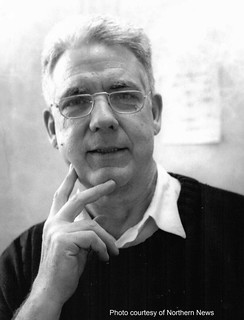 Dr. Harold Don Allen (July 2, 1931 – July 11, 2020) who taught generations of math
students and future teachers, instilled a sense of wonder in bright young people
about the beauty of numbers and cryptograms and brought a story-teller's passion to
numismatic history and collecting, from banknotes to milk tokens, passed away
quietly on in Brossard, Quebec, family at his side.
Dr. Harold Don Allen (July 2, 1931 – July 11, 2020) who taught generations of math
students and future teachers, instilled a sense of wonder in bright young people
about the beauty of numbers and cryptograms and brought a story-teller's passion to
numismatic history and collecting, from banknotes to milk tokens, passed away
quietly on in Brossard, Quebec, family at his side.
Don Allen was born and raised in Montreal, Canada, He earned his BSc in Mathematics and Physics with Distinction in 1952 from McGill University and Masters degrees from the University of Santa Clara in 1966 and Rutgers University in 1968. His doctorate in mathematics education, a source of enormous pride for him throughout his life, was conferred on him by Rutgers in 1977.

NEWMAN PORTAL TRANSCRIBES 1809 DIE MINT LETTER
The latest addition to the Newman Numismatic Portal is a transcription of a U.S. Mint letter regarding the recovery of an 1809 coin die. Project Coordinator Len Augsburger provided the following report. -Editor
A U.S. Mint Die From 1809
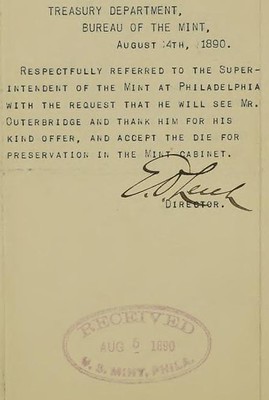 While the National Archives closure has disrupted our scanning activity of U.S. Mint archival materials, primarily correspondence, our focus shifts to transcribing portions of our previously scanned material. Uncovered this week was an 1890 letter discussing a U.S. Mint die from 1809, which somehow escaped the Mint and was returned by A. E. Outerbridge, Jr.
While the National Archives closure has disrupted our scanning activity of U.S. Mint archival materials, primarily correspondence, our focus shifts to transcribing portions of our previously scanned material. Uncovered this week was an 1890 letter discussing a U.S. Mint die from 1809, which somehow escaped the Mint and was returned by A. E. Outerbridge, Jr.
A quick Google search indicates that Outerbridge was of a scientific bent and employed as Vice President of the Thomas Devlin Manufacturing Company in Philadelphia, in the field of iron works and tool manufacturing. The letter related that the die was being used as a paperweight by the company stenographer and drew the attention of Outerbridge as a "curiosity.” Presumably the company acquired the die as scrap metal at some point.
A number of dies from the early U.S. Mint are known, with the largest group at the American Numismatic Society, these are documented in Secret History of the First U.S. Mint, pp. 72-80. This 1809 die may still exist in the National Numismatic Collection, or within the U.S. Mint itself. Newman Portal acknowledges Roger Burdette and Nicole Fry for developing transcriptions of the National Archives material.
Link to correspondence related to 1890 die:
https://nnp.wustl.edu/library/book/586056
Link to transcribed letters for 1890 on Newman Portal:
https://nnp.wustl.edu/library/archivedetail/515202?Year=1890&take=50
VIDEO: RALPH ROSS INTERVIEW
These are selections from the David Lisot Video Library that feature news and personalities from the world of coin collecting. David has been attending coin conventions since 1972 and began videotaping in 1985. The Newman Numismatic Portal now lists all David's videos on their website at:
https://nnp.wustl.edu/library/multimediadetail/522852
Here's one on Vice President Ralph Ross. -Editor
Ralph Ross Combines Coin Collecting and Academics for Young People.
Ralph Ross, Ph.D., Vice President, American Numismatic Association,
Interviewer, David Lisot, CoinTelevision.com.
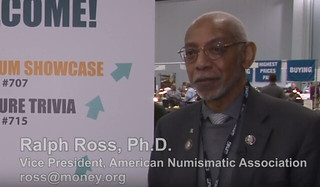 Dr. Ross has a unique view of numismatics. He is currently serves vice-president of the American Numismatic Association. He had a Ph.D in education and as an educator and academic he sees coin collecting as not just a hobby. He sees it as a life style. Hear about his vision in this candid interview on the floor of the ANA National Money Show in Atlanta in August 2019.
Dr. Ross has a unique view of numismatics. He is currently serves vice-president of the American Numismatic Association. He had a Ph.D in education and as an educator and academic he sees coin collecting as not just a hobby. He sees it as a life style. Hear about his vision in this candid interview on the floor of the ANA National Money Show in Atlanta in August 2019.
An excerpt of the video is available for viewing on the Coin Television YouTube Channel at:
https://youtu.be/6jDhUnKRe8Y
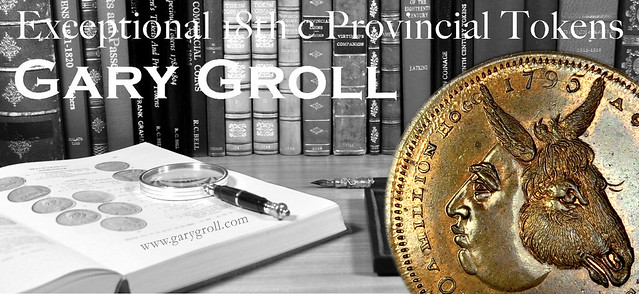
AUDIO: COINWEEK INTERVIEW WITH PETER TOMPA
Potential new restrictions on the import of ancient coins are a huge concern today. In their latest podcast, CoinWeek interviews Peter Tompa about the issue. -Editor
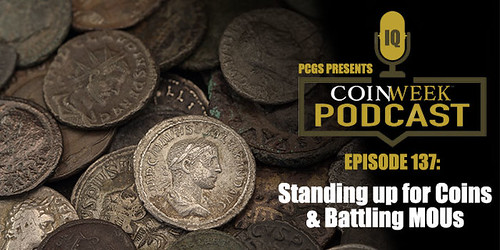
Today on the CoinWeek Podcast we talk to Peter Tompa about the pending renewal of a Memorandum of Understanding (MoU) between the United States and the Republic of Italy. This MoU renewal may pose a threat to the coin collecting hobby in the United States and abroad.
MoUs, or Memoranda of Understanding, are agreements between governments that set guidelines for policies that are in the mutual interest. In the case of the recent MoU negotiations between the United States and Italy, restrictions relating to the export of certain Roman coins are under consideration.
Peter Tompa, an attorney and a registered lobbyist for the PNG and the IAPN, has been fighting the good fight to protect our hobby from these burdensome government regulations.
To read the complete article, see:
CoinWeek Podcast #137: Standing Up for Coins and Battling MoUs (With Peter Tompa)
(https://coinweek.com/ancient-coins/coinweek-podcast-137-standing-up-for-coins-and-battling-mous-with-peter-tompa/)
To read the earlier E-Sylum articles, see:
HELP SAVE ROMAN IMPERIAL COIN COLLECTING
(https://www.coinbooks.org/v23/esylum_v23n27a13.html)
COINS 'TOO IMPORTANT FOR THE PUBLIC TO HOLD'
(https://www.coinbooks.org/v23/esylum_v23n28a11.html)
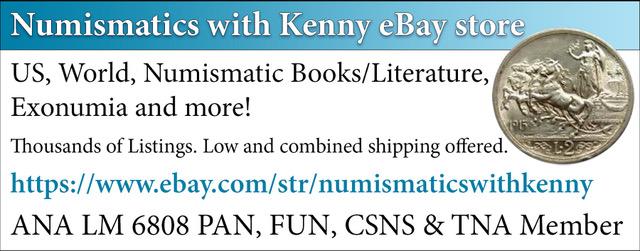
ANA CANCELS 2020 WORLD'S FAIR OF MONEY
Unable to secure a suitable alternative venue, the ANA has officially cancelled the 2020 World's Fair of Money. -Editor
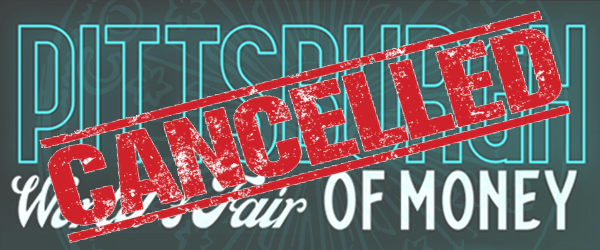
ANA Board of Governors Commits to Pittsburgh for 2023 Show
The American Numismatic Association (ANA) Board of Governors voted on July 14 to officially cancel the 2020 World's Fair of Money®. The show was originally scheduled for August 4-8 in Pittsburgh, Pennsylvania; however, COVID-19 restrictions made continuing with the Pittsburgh event unfeasible, and the Board voted in mid-June to postpone the event while it considered alternate sites and dates. The July 14 vote effectively terminated any further research and planning for a replacement location for the 2020 show given the current coronavirus situation and the inability of the ANA to assure the safety of its members, dealers, staff and visitors.
The Board did commit to Pittsburgh as the site for the 2023 World's Fair of Money, recognizing the outstanding planning developed by the local host committee in preparing for the cancelled 2020 show, provided that comparative contractual arrangements can be made.
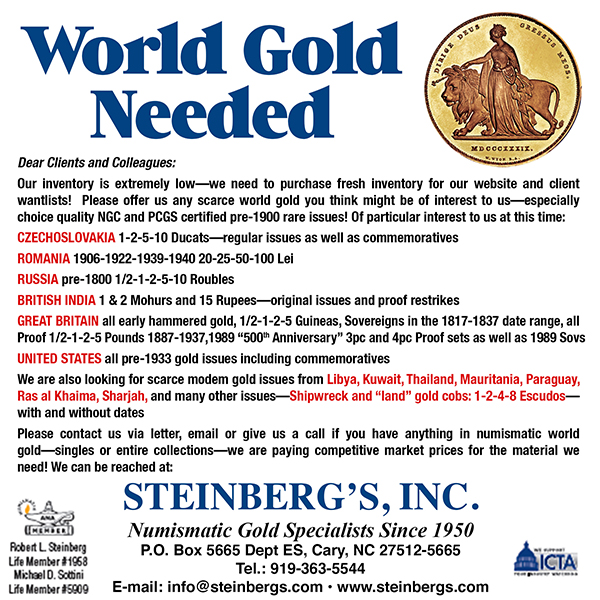
ANA MONEY TALKS LECTURE SERIES REGISTRATION
Registration is open for the American Numismatic Association's Money Talks series. Ordinarily presented in person at the annual World's Fair of Money convention, the ANA will be making these available as online events. -Editor

August 2020
Learn from fellow numismatists, collectors and ANA members about their passions and latest research.
These one-hour presentations are FREE and open to the public! Explore lectures and register below:
The Ultimate Large Cent Date & Type Set
This presentation will offer the ultimate eye-candy journey through the large cent series, with surprise tidbits and related revelations that will entertain you and leave you wanting more.
Instructor: John Wright
When: August 3, 2020 | 1:00 PM MDT
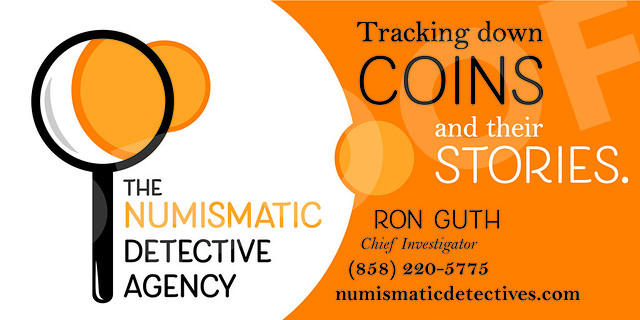
ANA SUNDMAN LECTURE SERIES REGISTRATION
And don't forget the excellent Sundman Lecture Series, which is also going online this year. -Editor
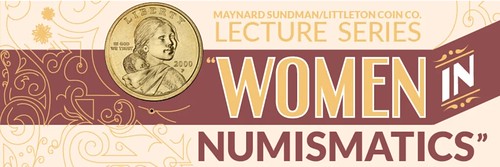
August 2020
The theme for this year's Sundman Lecture Series is Women in Numismatics.
These one-hour presentations are FREE and open to the public! Explore lectures and register below:
Visual Strategies of Suffrage, the 19th Amendment & American Coin Design
The visual language of women's suffrage is rendered on contemporary U.S. coins, including Adolph A. Weinman's Winged Liberty Head (aka "Mercury") dime and Walking Liberty half dollar, and on Hermon MacNeil's Standing Liberty quarter dollar, all first issued in 1916. These coins draw on a rich, visual vocabulary used to promote voting rights for women. For example, Weinman's "Wings of Thought” on his famed dime also is used in multiple contemporary suffragist posters, including Egbert C. Jacobson's "Equality Is the Sacred Law of Humanity,” and Liberty is used on Henry Mayer's image "The Awakening,” published in the 1915 satirical magazine Puck. This presentation will detail the role allegory played in the visual strategies of suffrage—on view will be examples of classically-inspired symbolism on American coinage in the early 20th century through the lens of the women's suffrage movement.
Instructor: Steve Roach
When: August 5, 2020 | 12:00 PM MDT
THE BOOK BAZARRE
2021 NEW YORK INTERNATIONAL CONVENTION
While the August ANA show is off, the January 2021 New York International is still being planned. Here's the press release. -Editor
 The 49th Annual New York International Numismatic Convention will be held at
the Grand Hyatt New York, located at 109 East 42nd Street between Lexington and Park Avenues from January 8 through January 17, 2021.
The 49th Annual New York International Numismatic Convention will be held at
the Grand Hyatt New York, located at 109 East 42nd Street between Lexington and Park Avenues from January 8 through January 17, 2021.
Kevin Foley, Bourse Chairman for the world and ancient specialty event, said of the convention's auction offerings. "We will once again have eight full days of auctions, with all of our eight companies from 2020 returning once again. Heritage will open their lot viewing at the Hyatt on Friday, January 8 and hold sessions Sunday and Monday, January 10 and 11. Classical Numismatic Group will open its viewing on Sunday, January 10 for sessions on Tuesday and Wednesday, January 12 and 13. The New York Sale, a four company consortium consisting of M&M Numismatics, Ira and Larry Goldberg, Sovereign Rarities and Dmitry Markov, will also open its lot viewing on Sunday, January 10 for sessions to be held Tuesday through Thursday, January 12-13-14.”

NOTES FROM E-SYLUM READERS: JULY 19, 2020
On the Pennsylvania Railroad Heroic Service Medal
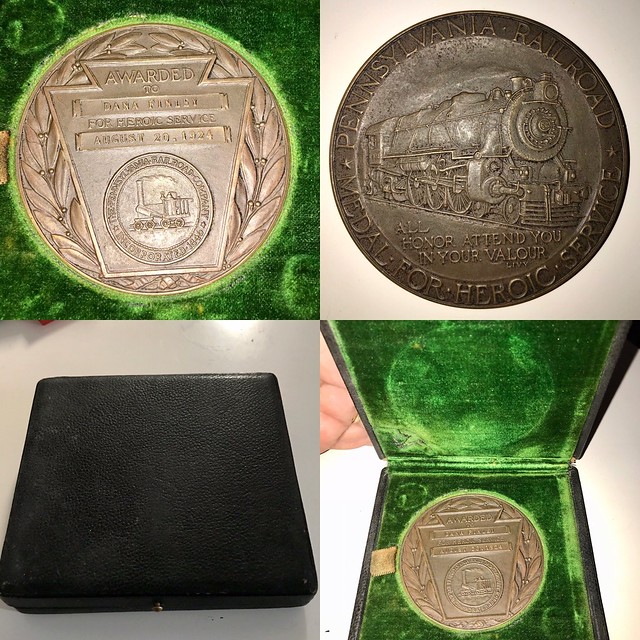
Kristen Reichardt of Hastings-on-Hudson, NY writes:
"I am in possession of one of the hero medals awarded by the Pennsylvania Railroad and was delighted to find your article discussing them.
"My maternal grandfather, Dana G. Finley, was a fireman aboard a tugboat in NY Harbor from approx 1915-1960. According to my mother, he jumped into the harbor to save somebody who had fallen into the water.
"I've always wanted to know more or to find some documentation to back up the family story, so thanks for your article."
You're welcome! Kristen provided the medal images above, and a New York Times article about the rescue. Thanks. Thanks also to contributors George Cuhaj and Harry Waterson for sharing their information on these. -Editor
To read the February 28, 1926 New York Times article (subscription required), see:
24 RAIL EMPLOYES GET VALOR AWARDS
(https://timesmachine.nytimes.com/timesmachine/1926/02/28/100053549.html?pageNumber=80)
To read the earlier E-Sylum article, see:
THE PENNSYLVANIA RAILROAD HEROIC SERVICE MEDAL
(https://www.coinbooks.org/v21/esylum_v21n39a11.html)
Nicholas Rhodes and the Coinage of Tripura Book
Peter Preston-Morley writes:
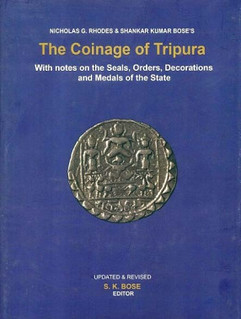 "In your latest E-Sylum you refer to a book on the coinage of Tripura and its 'pointless synopsis'. I should point out (and doubtless others may too) that Nicholas Rhodes died in 2011. He remains much-missed in the world of Indian and Oriental numismatics."
"In your latest E-Sylum you refer to a book on the coinage of Tripura and its 'pointless synopsis'. I should point out (and doubtless others may too) that Nicholas Rhodes died in 2011. He remains much-missed in the world of Indian and Oriental numismatics."
The only information we had on this book came from the seller's marketing material, and the publication date was nowhere to be found. Like the Synopsis, the provided information was of little use. But this is a "Revised and Updated" edition, likely published post the death of Rhodes, perhaps even this year. Can anyone confirm the publication date? -Editor
To read the earlier E-Sylum article, see:
NEW BOOK: THE COINAGE OF TRIPURA
(https://www.coinbooks.org/v23/esylum_v23n28a03.html)
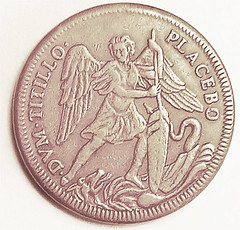 Other topics this week include
the Peratrovich Dollar Alaska "release",
the translation of "placebo",
the 1944 Germany Allied military currency 10-mark note,
bookseller H. W. Gumaer,
the Bebee Double-Denomination Note, and
numismatic author A. M. Smith.
Other topics this week include
the Peratrovich Dollar Alaska "release",
the translation of "placebo",
the 1944 Germany Allied military currency 10-mark note,
bookseller H. W. Gumaer,
the Bebee Double-Denomination Note, and
numismatic author A. M. Smith.

STANDARD COIN CARD MYSTERY
Researcher and author David Lange made an interesting discovery recently. "Standard Coin Card 206" is shown at right below. -Editor
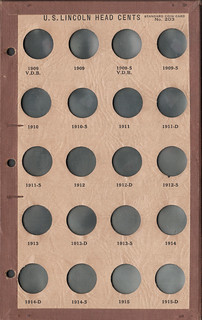 It's pretty rare that I find something new to me in the area of coin albums, but a new entry did pop up. An eBay seller had several coin album pages that feature the color scheme and materials of the National Coin Album brand, but there is nothing in the Wayte Raymond literature to indicate he produced them.
It's pretty rare that I find something new to me in the area of coin albums, but a new entry did pop up. An eBay seller had several coin album pages that feature the color scheme and materials of the National Coin Album brand, but there is nothing in the Wayte Raymond literature to indicate he produced them.
There are four different pages that together hold a set of Lincoln Cents 1909-37. These are titled in very small letters STANDARD COIN CARD 203 through 206. A fifth page was also listed that was similar in construction but without printed dates or a number. Some user had neatly lettered it to continue the series up to 1944.
VOCABULARY TERM: EDGE
Dick Johnson submitted this entry from his Encyclopedia of Coin and Medal Terminology. Thanks! I added a couple images. -Editor
Edge. The outer circumference or plane of a numismatic or medallic item formed by the thickness of the piece. Edges are not to be confused with border or rims, which are parts of the obverse and reverse planes; but edges extend from the termination of the border or rim on one side to the termination on the opposite side of the piece, from one rim/edge juncture to the other.
The shape of the edge adds to its artistic effect. Basically there are seven shapes:
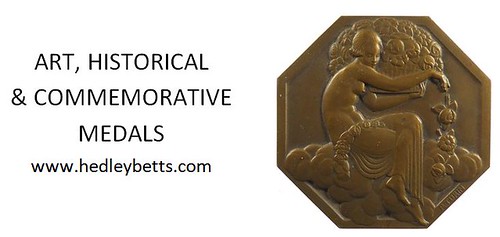
WAITE B. LEWIS (1871-1936)
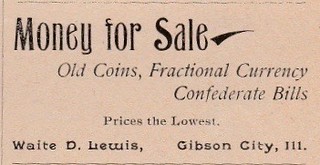 Waite B. Lewis (1871-1936), was born in Pleasant Township, Fulton, Illinois, on September 19, 1871, the son of a farmer and native of New York, Rosseel Lewis (1841-1915), and Lucinda Elizabeth Sargent Lewis (1839-1915). The family lived on their farm in Mount Pleasant, Whiteside, Illinois. He was educated at the Cottonwood Grove School, Bond County, Illinois. On June 12, 1890, he married Mattie Irene Hollinshead (1870-1947), daughter of Canadian born Joshua Hollinshead, and his wife Mehitable May Appleby Hollinshead, at the bride's family's home in Ustick.
Waite B. Lewis (1871-1936), was born in Pleasant Township, Fulton, Illinois, on September 19, 1871, the son of a farmer and native of New York, Rosseel Lewis (1841-1915), and Lucinda Elizabeth Sargent Lewis (1839-1915). The family lived on their farm in Mount Pleasant, Whiteside, Illinois. He was educated at the Cottonwood Grove School, Bond County, Illinois. On June 12, 1890, he married Mattie Irene Hollinshead (1870-1947), daughter of Canadian born Joshua Hollinshead, and his wife Mehitable May Appleby Hollinshead, at the bride's family's home in Ustick.
He worked for thirty years in the union stock yards in Chicago as a cattle salesman. In March 1898, the Daily Register Gazette, reported he had nine loads of hogs shipped to Morrison. He seems to have had a livestock sales office in Gibson City, Fords County, Illinois, and in 1898, worked part-time as a coin dealer.
HARVEY STACK'S NUMISMATIC FAMILY, PART 74
The latest article in Harvey Stack's blog series continues the discussion of auction sales of 1978. Thanks, Harvey. -Editor
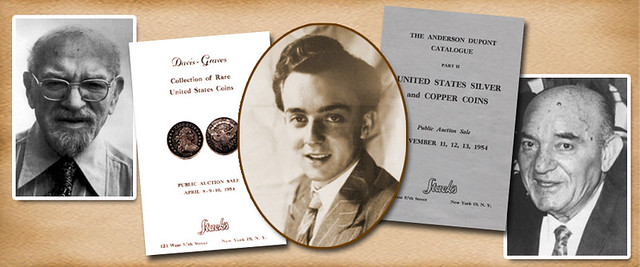
Along with the firm's retail business, Stack's public auction program continued to grow. Our sales included collections built by long established clients who had passed away, as well as others who came to Stack's when they were ready to sell, recognizing our long-term success in the field.
In 1978 we conducted nine different public auctions, as well as several mail bid only sales held through our associate firm Coin Galleries. In addition to a greater number of sales, the auctions also grew in the number of lots they contained compared to earlier years. These offered a great variety of material in all grades and gave most collectors the opportunity during the year to add to their collections.
In February we offered an old timer's collection – the Goshen Collection of U.S. and Foreign Gold, Silver and Copper Coins, consisting of over 1,600 lots. Highlights included Proof coins of 1857, 1858 and 1873, plus numerous other rare and choice U.S. coins. The World portion of the sale had a wonderful type offering of coins of the 20th century. In March, Stack's offered the Fraser Collection of U.S. Gold, Silver and Copper Coins, 1,120 lots featuring a comprehensive selection of each series. Our Spring Sale in April was another general offering of United States coins, 930 lots that attracted many buyers.
SOFAER COLLECTION OF PALESTINE COINS AND TOKENS
A great collection of Palestine coins and tokens will be sold by Goldberg Auctions in September. Here's the announcement. -Editor
in September 13-16 Goldberg Sale
Auctioneer Ira Goldberg says that "Palestine coins are hot, and so, the appearance of high quality Mint State Palestine Mandate coins from the Abraham Sofaer Collection, in our September 13-16, 2020 Goldberg Auction, should attract serious interest from collectors in the United States and abroad.”
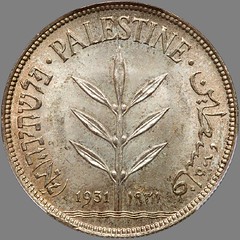
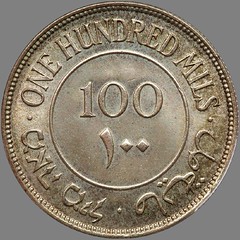
1931 Palestine 100 Mils
Several of the Palestine Mandate coins are among the finest known, like: (1) 50 Mils, 1931; second lowest mintage in the series – only 500,000; awesome coin with satiny surfaces covered by dazzling gold and peacock-green iridescence; PCGS graded MS-65, Pop 2/0, none graded finer by PCGS; estimated at $5000 up; and (2) 100 Mils, 1931; satiny white, near-gem surfaces, with attractive golden patina around devices and inscriptions; PCGS graded MS-64, Pop 1/0, the single finest example of this low mintage (250,000) from either PCGS or NGC; estimated at $5000 up.
NUMISMATIC NUGGETS: JULY 19, 2020
Here's a selection of interesting or unusual items I came across in the marketplace this week. Tell us what you think of some of these. -Editor
Armand Caque Benjamin Franklin Medal
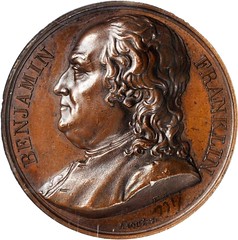
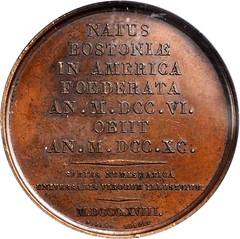
"1818" (ca. 1830) Benjamin Franklin Series Numismatica Medal. By Armand Caque. Greenslet GM-42, Fuld FR.M.SE.1. Bronze. Plain Edge. MS-62 BN (NGC).
41 mm.
Bold, high relief design. Great portrait! From the Stack's Bowers August 2020 Auction. -Editor
To read the complete lot description, see:
"1818" (ca. 1830) Benjamin Franklin Series Numismatica Medal. By Armand Caque. Greenslet GM-42, Fuld FR.M.SE.1. Bronze. Plain Edge. MS-6...
(https://auctions.stacksbowers.com/lots/view/3-NM413/1818-ca-1830-benjamin-franklin-series-numismatica-medal-by-armand-caque-greenslet-gm-42-fuld-frmse1-bronze-plain-edge-ms-6)
Other topics this week include a Central American Republic 8 Reales, a Kentucky Civil War sutler token, an 1866 Shield Nickel Pattern, and the Royal Mint Elton John coin.
THE BYZANTINE ANONYMOUS FOLLIS
Mike Markowitz published another article in his Ancient Coin Series for CoinWeek; this one is on the Byzantine Anonymous Follis. Here's an excerpt - see the complete article online. -Editor
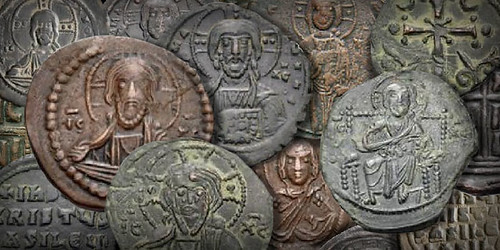
IN THE ANCIENT WORLD, gold and silver were the coinage of the elite, but humble copper was the coinage of the common folk.
For over 120 years, the single denomination of copper coinage issued by the Eastern Roman ("Byzantine”) Empire was "Anonymous”. The Anonymous follis did not bear the name or portrait of the ruler but instead bore an image of Jesus and a religious motto. Fifteen different types are known, though only about six are common, with affordable and collectible examples. These coins are often carelessly overstruck, and generations of painstaking research by numismatists have made it possible to reconstruct the sequence of this fascinating series.
JEFF BURKE'S NEW 1909 V.D.B. LINCOLN CENT
Jeff Burke submitted these notes on his acquisition of a beautiful 1909 V.D.B. Lincoln cent. Thanks! -Editor

As a young boy in the early 1970s, I kept my coin collection in an antique green trunk at our home in Hastings, Nebraska. This treasure chest was always at the foot of my bed in a basement bedroom that I shared with my brother Tom. On special occasions like Christmas, I would haul the trunk upstairs to the study room (shown in the photo) to examine my coins within eyeshot of the brightly decorated Christmas tree in our living room. To learn more about coins, I read the old newspaper-style Coin World on a regular basis. One of my trunk treasures was a 1909-S V.D.B. Lincoln cent in EF. I purchased this coin for $175.00 from a company in California after seeing an ad in Coin World. I earned every penny of the $175.00 sweating over a push lawn mower in neighborhood yards.
On a personal note, the 1909 V.D.B. Lincoln cent reminded me of our family trip to the East Coast during the summer of 1969 or 1970. Our itinerary included inside tours of the Philadelphia Mint as well as the White House. Despite having to wait in line for several hours at the latter's East Wing entrance, we finally had a magnificent guided walk through the presidential home! It was also quite a thrill to tour our nation's first mint. I recall that we stayed with my mother's Uncle Ed and Aunt Peg Waltemath and my cousins, who lived in the Philadelphia area. They took us to see the giant King of Prussia Mall near Philadelphia. Of course I found a few coins to purchase at a coin store in this behemoth!
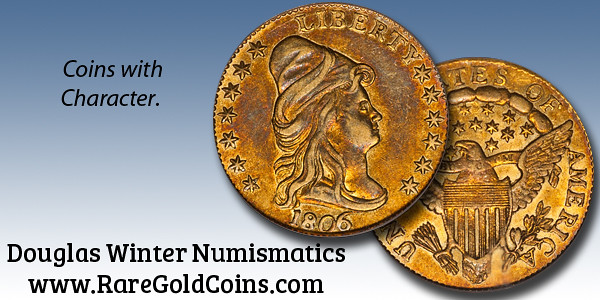
1910 EXPERIMENTAL FINISH DOUBLE EAGLE
This article comes from the July 14, 2020 Coin News email from Heritage Auctions. -Editor
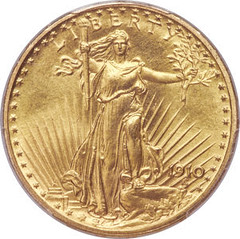
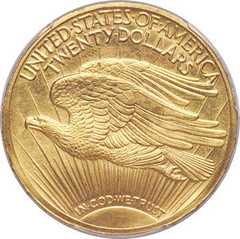
The United States Mint struggled to find a popular finish for gold proof coins throughout the early 20th century Renaissance of American coinage that Roger W. Burdette has so thoroughly chronicled in his popular writings. Various types of sandblast and satin finishes were adopted at different times, and even more experimental finishes were briefly tinkered with, but none were found that addressed both the technical needs of the coiners and the aesthetic sensibilities of the collectors. Many issues with experimental finishes have vanished without a trace, as the Mint did not carefully document all their endeavors in this regard, as long as the bullion accounts balanced. Experimental pieces that were not adopted for coinage were usually melted for recoinage and forgotten. Fortunately, some extremely rare experimental pieces have survived to give us a glimpse of this colorful, "behind the scenes" era in Mint history.
1919 NEW YORK ASSAY OFFICE SILVER INGOT
A recent update to Ken Conaway's Silver Ingots site highlights the 1919 United States Assay Office New York ingot; the 1920 ingot was already part of the collection. -Editor
 The 1919 United States Assay Office New York silver ingot No. 4186, 6.27 ozs & Melt No. 7 is one of the most noteworthy, early United States Government silver ingots known to exist. By far, this ingot has the most distinguished provenance of any United States Government silver ingot in existence. The first owner on record of this ingot was Dan Brown of Dan Brown's Coin Shop in Denver, CO. Clarence Criswell acquired it from Dan Brown in the early 1970's, and held it in his United States Government silver ingot collection until it was sold at the 1984 American Numismatic Association Convention Auction by Kurt R. Kruger in Detroit, MI July 28 - 30, 1984.
The 1919 United States Assay Office New York silver ingot No. 4186, 6.27 ozs & Melt No. 7 is one of the most noteworthy, early United States Government silver ingots known to exist. By far, this ingot has the most distinguished provenance of any United States Government silver ingot in existence. The first owner on record of this ingot was Dan Brown of Dan Brown's Coin Shop in Denver, CO. Clarence Criswell acquired it from Dan Brown in the early 1970's, and held it in his United States Government silver ingot collection until it was sold at the 1984 American Numismatic Association Convention Auction by Kurt R. Kruger in Detroit, MI July 28 - 30, 1984.
Thanks to Bryce Brown's Auction Catalogs, I have been able to acquire an original American Numismatic Association Convention Auction catalog as well as an original Settlement Price Sheet from the Detroit 1984 ANA auction, adding to the provenance of this ingot.
THE CASE OF THE BOGUS BURNING BILL
Here's an interesting legal case from the files of the Richmond Register. -Editor
He liked to place a bet now and then and he liked to drink a little here and there -- which got him into a lot of trouble.
He went to the race track one day and placed several bets judiciously, won a lot of money and ended up before a judge. On the way home from the track, he decided to stop at a local gin mill to celebrate his good fortune and, after hoisting too many, was arrested. Not for being a ruckus but for passing counterfeit money.
It seemed that during his celebration, Harry flamboyantly took a $5 bill of out his wallet, placed a match to it and along with several other boozers, watched it burn to a crisp. Whereupon, the bartender examined what was left of the fiver and deciding it was funny money, had Harry hauled off to jail on charges of making money without earning it.
LOUIS COLAVECCHIO, MASTER COUNTERFEITER
The New York Times published an obituary of counterfeiter Louis Colavecchio -Editor
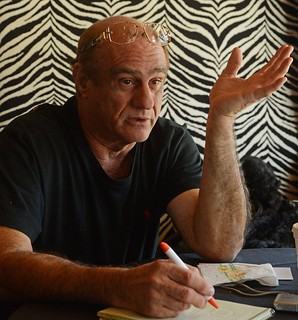 In 1996, just after he was arrested by Secret Service agents and New Jersey gaming troopers at Caesars Palace in Atlantic City, Louis Colavecchio laughed.
In 1996, just after he was arrested by Secret Service agents and New Jersey gaming troopers at Caesars Palace in Atlantic City, Louis Colavecchio laughed.
His red Honda, loaded up with nearly 800 pounds of high-quality counterfeit slot machine tokens, had easily made its way into the casino's parking garage because of modifications to its trunk. But a New Jersey trooper's Buick cruiser, now hauling the bogus tokens in its trunk, was not so lucky.
Sagging under the weight of the coins, the rear of the police car dropped when it hit a speed bump, and its muffler and tailpipe were knocked off. As he recalled in his memoir, "You Thought It Was More: Adventures of the World's Greatest Counterfeiter” (2015), Mr. Colavecchio, riding in the back seat, chuckled at the trooper's misfortune.
OFFSET PRINTING ERRORS
With permission we're publishing this excerpt from an article on offset printing errors by Ben Simpson in the July/August issue of ErrorScope, the publication of the Combined Organizations of Numismatic Error Collectors of America (CONECA). Thanks to editor Allan Anderson for providing the text and images. -Editor
Paper Money Errors: The Offset Printing
By Benjamin C. Simpson, YN
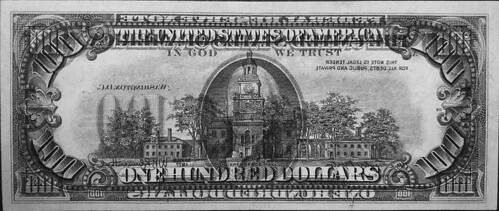
Few paper money mistakes are more captivating than the offset. It is easy to understand why this error type is so popular; their impressive appearance and affordability make them a perfect entry point for currency collectors.
Offset printings are roughly analogous to clashed dies for coins. When the impression cylinder is mistakenly rolled over a wet printing plate without a sheet of notes intervening, the ink design on the plate is transferred to the impression cylinder itself. This blunder causes the subsequent sheets of notes to be printed with its usual design on one face (transferred from the plate) and a mirror image of that design on the other face (erroneously transferred from the impression cylinder). A reflection has been produced on the opposite side of the note. On all small-size U.S. currency, there are multiple printing stages. Offset errors most commonly occur in the first printing, when most major design elements are produced.
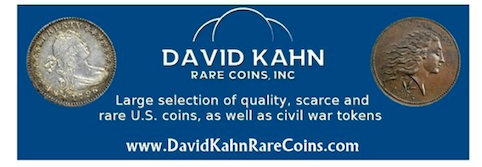
MORE ON THE 2020 TENINO WOODEN SCRIP
Here's an excerpt from another article on Tenino's wooden COVID-19 relief scrip from the Thompson Reuters Foundation, published July 18, 2020 by The Dispatch. -Editor
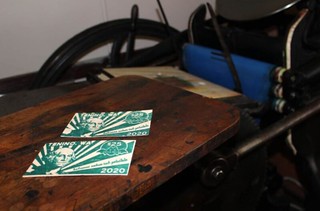 Tucked away under lock and key in a former railroad depot turned small-town museum in the U.S. state of Washington, a wooden printing press cranked back to life to mint currency after nearly 90 dormant years.
Tucked away under lock and key in a former railroad depot turned small-town museum in the U.S. state of Washington, a wooden printing press cranked back to life to mint currency after nearly 90 dormant years.
The end product: $25 wooden bills bearing the town's name – Tenino – with the words "COVID Relief” superimposed on the image of a bat and the Latin phrase "Habemus autem sub potestate” (We have it under control) printed in cursive.
With the coronavirus pandemic plunging the United States into a recession, decimating small businesses and causing job losses across the country, some local governments are looking for innovative ways to help residents weather the storm.

CBS TENINO WOODEN MONEY SEGMENT
Bob Fritsch writes:
"This CBS Sunday Morning report on Tenino's wooden money was on TV this morning. Thanks to Terri Ventresca of The Elongated Collectors for the tipoff."
Thanks. It's nicely done. Here's an excerpt from the text; see the link below to watch the segment. -Editor
Like a lot of small towns, Tenino, Washington, was hit hard economically by the COVID shutdown. Residents like Laurie Mahlenbrei, an out-of-work schoolbus driver, have been struggling. "It's been really difficult," she said. "I mean, I've been washing windows, scrubbing floors, cutting down trees, mowing lawns, whatever I can for a buck."
But there's something unusual going on in this town of 1,800 people. The city government of Tenino is doing what it can to help folks like Mahlenbrei, not with a check, or even a debit card, but with – believe it or not – a pile of wood.
"Every once in a while I run into a cashier that hasn't taken it before," said Mahlenbrei. "But it's just a blast, you know? I mean, I'm paying for food with something historical, you know?"
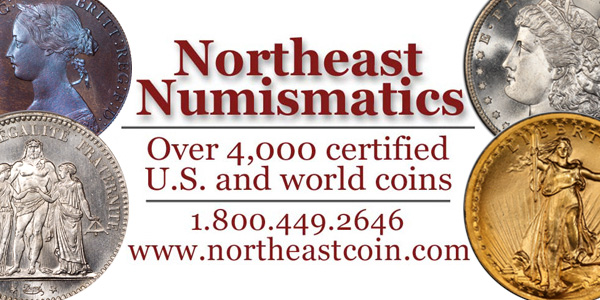
OMAN'S NEW 50 RIAL BANKNOTE
The Bank of Oman announced a new 50 rial banknote. Found via News & Notes from the Society of Paper Money Collectors (Volume VI, Number 4, July 14, 2020). -Editor
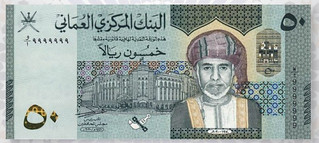 The Central Bank of Oman announced today that it will issue this month a new banknote of 50 rials of the Sixth Series (OMR50.5) to commemorate the 50th Anniversary of the rise of the Modern Omani Renaissance, and in memory of its founder, the late His Majesty Sultan Qaboos bin Said bin Taymur.
The Central Bank of Oman announced today that it will issue this month a new banknote of 50 rials of the Sixth Series (OMR50.5) to commemorate the 50th Anniversary of the rise of the Modern Omani Renaissance, and in memory of its founder, the late His Majesty Sultan Qaboos bin Said bin Taymur.
The Central Bank will complete the Sixth Series in the last quarter of the year with the release of the following denominations:
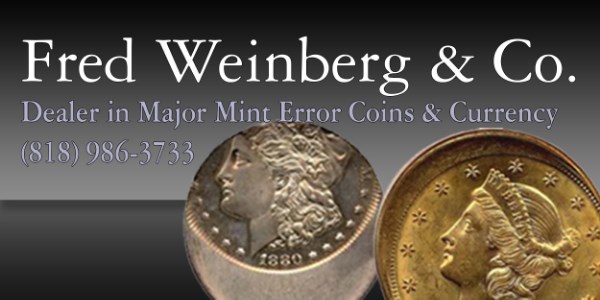
LOOSE CHANGE: JULY 19, 2020
Here are some additional items in the media this week that may be of interest. -Editor
Hoax 'Devil Coin' Offered
Jeff Starck of Coin World published a piece about the "satanic coin” tied to a famous hoax in Denmark. -Editor

A "satanic coin” tied to a famous hoax in Denmark is coming to auction.
Anholt is a tiny island in the North Sea between Jutland and Sweden, but its infamous numismatic output is one for the ages.
Bruun Rasmussen's Aug. 2 auction includes one of the copper pieces from a curious episode of history.
The pieces are evidence of a multinational prank orchestrated by a mild-mannered Danish art gallery clerk.
To read the complete article, see:
Coin from Denmark satanic hoax headed for August auction
(https://www.coinworld.com/news/world-coins/coin-from-denmark-satanic-hoax-headed-for-august-auction)
To read the earlier E-Sylum article, see:
HOAX 'DEVIL COINS' FOUND AT BATH ABBEY
(https://www.coinbooks.org/v21/esylum_v21n26a35.html)
Other topics this week include the Latin Monetary Union, and Chinese corporate chopmarks.
SHORTAGE LEADS BANKS TO PAY PREMIUM FOR CHANGE
It was bound to happen sooner or later. Some banks are now paying a premium for small change amid the coronavirus coin shortage. -Editor
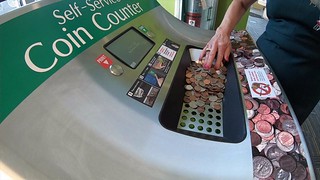 Do you have a jar of coins in your house? Maybe you have been saving for a special occasion? Well, a local bank says they will pay you for what's inside that jar — plus interest!
Do you have a jar of coins in your house? Maybe you have been saving for a special occasion? Well, a local bank says they will pay you for what's inside that jar — plus interest!
"It has never happened before, it's something new, and it's interesting…I really didn`t expect coin shortage to be something we have to deal with,” said Neil Buchanan of Community State Bank.
A literal coin shortage has made it nearly impossible for some local businesses to deal with the hard currency.
"So what do we do, and we kicked around ideas, and said, ‘You know what, we're buying it off the Fed. We might as well just pay our local people instead and kind of cut out the middle man sort of,'” Buchanan said.
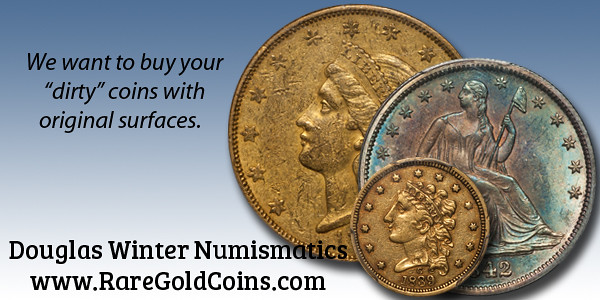

The E-Sylum is an electronic publication of the Numismatic Bibliomania Society
Copyright © 1998 - 2025
The E-Sylum is an electronic publication of the Numismatic Bibliomania Society
Copyright © 1998 - 2025
The E-Sylum is an electronic publication of the Numismatic Bibliomania Society
Copyright © 1998 - 2025
